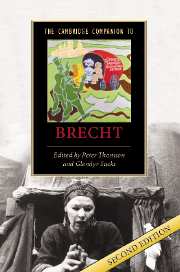Book contents
- Frontmatter
- Part I Context and Life
- Part II The Plays
- Part III Theories and Practices
- 12 Brecht and the Berliner Ensemble - the making of a model
- 13 Revolutionising theatre: Brecht’s reinvention of the dramaturg
- 14 Key words in Brecht’s theory and practice of theatre
- 15 Brecht’s poetry
- 16 Brecht and music: theory and practice
- 17 Brecht and stage design: the Bühnenbildner and the Bühnenbauer
- 18 Actors on Brecht
- 19 Brecht and film
- Bibliography
- Index
- Series List
14 - Key words in Brecht’s theory and practice of theatre
from Part III - Theories and Practices
Published online by Cambridge University Press: 28 March 2007
- Frontmatter
- Part I Context and Life
- Part II The Plays
- Part III Theories and Practices
- 12 Brecht and the Berliner Ensemble - the making of a model
- 13 Revolutionising theatre: Brecht’s reinvention of the dramaturg
- 14 Key words in Brecht’s theory and practice of theatre
- 15 Brecht’s poetry
- 16 Brecht and music: theory and practice
- 17 Brecht and stage design: the Bühnenbildner and the Bühnenbauer
- 18 Actors on Brecht
- 19 Brecht and film
- Bibliography
- Index
- Series List
Summary
Introduction: Dialectics
The most damaging yet most common error in discussions of Brecht's theory has been to see it as fixed and unchanging, and to view it therefore as either dogmatic, communist-inspired abstraction or revered holy writ. Behind these views lie different perceptions of Marxism and the rights and wrongs of political art. Brecht began to think through the ideas with which he is most commonly associated in the late 1920s and early 1930s. His emphasis and terminology changed in these years, as well as subsequently, and many see in his later remarks and essays (especially A Short Organum for the Theatre, 1948) a belated acceptance of the conventions of realism and the realities of emotional experience suppressed by the supposed sterile intellectualism of his earlier years. In this way Brecht has often come to be admired as a great writer, particularly in the West, in spite of his theory: as at once reconciled with his own youthful hedonism and with the forms and verities of an art above theory and politics. In fact, this is simply to read Brecht in terms of one favoured aesthetic ideology rather than another, and to compromise his art and ideas as much, though in another direction, as a protective state socialism ever did. If we are to approach his ideas more constructively, we need to understand how they emerged and changed in particular artistic and social circumstances, and see them, moreover, as belonging with clusters of related terms and concepts in what was a developing self-critical aesthetic and theatre practice.
- Type
- Chapter
- Information
- The Cambridge Companion to Brecht , pp. 209 - 224Publisher: Cambridge University PressPrint publication year: 2006
- 7
- Cited by



